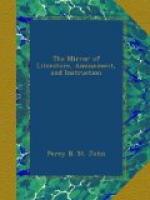As our limits will not allow us to quote the whole of the ballad,[1] we must content ourselves with giving the song of the beggar, which, as well as being the most interesting, contains the whole of the legend concerning de Montfort:—
A poore beggar’s daughter did dwell
on a greene,
Who for her fairnesse might well be a
queene:
A blithe bonny lasse, and a daintye was
shee,
And many one called her pretty Bessee.
Her father hee had noe goods nor noe land,
But begg’d for a penny all day with his hand;
And yett to her marriage he gave thousands three,
And still he hath somewhat for pretty Bessee.
And if any one here her birth doe disdaine,
Her father is ready, with might and with maine,
To prove shee is come of noble degree—
Therefore, ever flout att prettye Bessee.
* * * * *
Then give me leave, nobles and gentles, each one,
One song more to sing, and then I have done;
And if that itt may not winn good report,
Then doe not give me a Groat for my sport.
Sir Simon de Montfort my subject shall bee.
Once chiefe of all the great barons was hee—
Yet fortune so cruelle this lorde did abase,
Now loste and forgotten are hee and his race.
When the barons in armes did King Henrye
oppose,
Sir Simon de Montfort their leader they
chose—
A leader of courage undaunted was hee,
And oft-times he made their enemyes flee.
At length in the battle on Eveshame plaine
The barons were routed, and Montfort was
slaine;
Moste fatall that battel did prove unto
thee,
Thoughe thou wast not borne then, my prettye
Bessee!
Along with the nobles that fell at that
tyde,
His eldest son Henrye, who fought by his
side,
Was fellde by a blowe he receiv’de
in the fighte!
A blowe that depriv’de him for ever
of sight.




